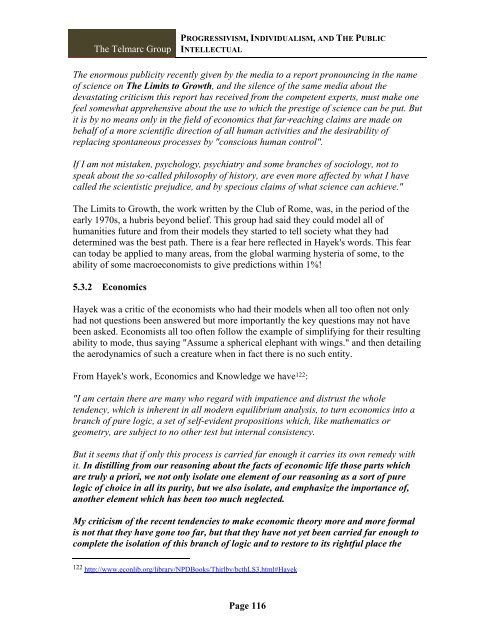progressivism, individualism, and the public ... - Telmarc Group
progressivism, individualism, and the public ... - Telmarc Group
progressivism, individualism, and the public ... - Telmarc Group
You also want an ePaper? Increase the reach of your titles
YUMPU automatically turns print PDFs into web optimized ePapers that Google loves.
The <strong>Telmarc</strong> <strong>Group</strong><br />
PROGRESSIVISM, INDIVIDUALISM, AND THE PUBLIC<br />
INTELLECTUAL<br />
The enormous <strong>public</strong>ity recently given by <strong>the</strong> media to a report pronouncing in <strong>the</strong> name<br />
of science on The Limits to Growth, <strong>and</strong> <strong>the</strong> silence of <strong>the</strong> same media about <strong>the</strong><br />
devastating criticism this report has received from <strong>the</strong> competent experts, must make one<br />
feel somewhat apprehensive about <strong>the</strong> use to which <strong>the</strong> prestige of science can be put. But<br />
it is by no means only in <strong>the</strong> field of economics that far‐reaching claims are made on<br />
behalf of a more scientific direction of all human activities <strong>and</strong> <strong>the</strong> desirability of<br />
replacing spontaneous processes by "conscious human control".<br />
If I am not mistaken, psychology, psychiatry <strong>and</strong> some branches of sociology, not to<br />
speak about <strong>the</strong> so‐called philosophy of history, are even more affected by what I have<br />
called <strong>the</strong> scientistic prejudice, <strong>and</strong> by specious claims of what science can achieve."<br />
The Limits to Growth, <strong>the</strong> work written by <strong>the</strong> Club of Rome, was, in <strong>the</strong> period of <strong>the</strong><br />
early 1970s, a hubris beyond belief. This group had said <strong>the</strong>y could model all of<br />
humanities future <strong>and</strong> from <strong>the</strong>ir models <strong>the</strong>y started to tell society what <strong>the</strong>y had<br />
determined was <strong>the</strong> best path. There is a fear here reflected in Hayek's words. This fear<br />
can today be applied to many areas, from <strong>the</strong> global warming hysteria of some, to <strong>the</strong><br />
ability of some macroeconomists to give predictions within 1%!<br />
5.3.2 Economics<br />
Hayek was a critic of <strong>the</strong> economists who had <strong>the</strong>ir models when all too often not only<br />
had not questions been answered but more importantly <strong>the</strong> key questions may not have<br />
been asked. Economists all too often follow <strong>the</strong> example of simplifying for <strong>the</strong>ir resulting<br />
ability to mode, thus saying "Assume a spherical elephant with wings." <strong>and</strong> <strong>the</strong>n detailing<br />
<strong>the</strong> aerodynamics of such a creature when in fact <strong>the</strong>re is no such entity.<br />
From Hayek's work, Economics <strong>and</strong> Knowledge we have 122 :<br />
"I am certain <strong>the</strong>re are many who regard with impatience <strong>and</strong> distrust <strong>the</strong> whole<br />
tendency, which is inherent in all modern equilibrium analysis, to turn economics into a<br />
branch of pure logic, a set of self-evident propositions which, like ma<strong>the</strong>matics or<br />
geometry, are subject to no o<strong>the</strong>r test but internal consistency.<br />
But it seems that if only this process is carried far enough it carries its own remedy with<br />
it. In distilling from our reasoning about <strong>the</strong> facts of economic life those parts which<br />
are truly a priori, we not only isolate one element of our reasoning as a sort of pure<br />
logic of choice in all its purity, but we also isolate, <strong>and</strong> emphasize <strong>the</strong> importance of,<br />
ano<strong>the</strong>r element which has been too much neglected.<br />
My criticism of <strong>the</strong> recent tendencies to make economic <strong>the</strong>ory more <strong>and</strong> more formal<br />
is not that <strong>the</strong>y have gone too far, but that <strong>the</strong>y have not yet been carried far enough to<br />
complete <strong>the</strong> isolation of this branch of logic <strong>and</strong> to restore to its rightful place <strong>the</strong><br />
122 http://www.econlib.org/library/NPDBooks/Thirlby/bcthLS3.html#Hayek<br />
Page 116












